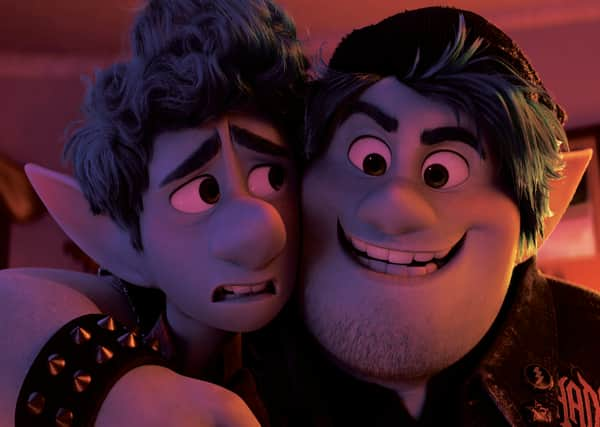Film reviews: Onward | Military Wives | Toni Morrison: The Pieces I Am


Onward (U) ***
Military Wives (12A) **
Toni Morrison: The Pieces I Am (12A) ****
Amidst Pixar’s recent slew of entertaining-yet-inessential sequels, the pioneering animation studio has shown it can still hit creative high points by building smart, playful, emotionally engaging films out of daringly abstract concepts. For every Inside Out or Coco, though, there’s also a Good Dinosaur or a Brave – films that can be entertaining enough in the moment, but lack the magic to pull off their high concept twists. Onward falls very much into this latter category, which is somewhat ironic given it takes place in a literal fantasy world where magic has faded. Indeed, it’d be hard to come up with a more apt symbol for Onward’s failings than its own general premise.
The film establishes this in the opening moments. The world may be populated by elves, centaurs and countless winged creatures with human personalities, but we’re no longer in the Middle Earth-style dark ages. Modern technology has eliminated the need to use spells and incantations to generate heat, light and electricity, so now the film’s mythical characters live like us in boring old suburbia – a place where regular jobs have to be worked, school has to be attended and magic has become a story element in role-playing games, not something actively practiced by those who still have the ability to do it. In other words, it’s kind of a fantasy spin on the superhero world of The Incredibles, albeit with an unappealing whiff of rival studio DreamWorks’ Shrek franchise.
Advertisement
Hide AdAt the film’s core, though, is the story of an awkward, friendless teenage elf called Ian Lightfoot (Tom Holland). Ian’s father passed away before he was born, but he’s left instructions with Ian’s loving mother (voiced by Julia Louis-Drefyus) to present him and his wayward older brother Barley (Chris Pratt doing a shoddy Jack Black impression) with a gift on Ian’s 16th birthday. This gift turns out to be a magic spell that will allow the boys to have a single day with their father (forget about their poor mother; she doesn’t get a look in here). Unfortunately they botch the spell and resurrect only their father’s lower half, necessitating a race-against-time quest to bring back the rest of him.
It’s an intriguing idea and co-writer/director Dan Scanlon (Monsters University) does manage to take the film to an interesting, if not entirely surprising, place that allows him to tease out the brotherly love theme with heart-tugging Pixar panache. But the whole 1980s-riffing teenage fantasy quest narrative has already been flogged to death by Stranger Things and the twist of having anthropomorphic fantasy creatures for protagonists isn’t all that engaging. It’s fine for kids; it’s just disappointing that, like its heroes, the film only manages to cast half a spell.
Based on a true story that’s already been effectively told via the BBC’s reality show The Choir, Military Wives takes the origins of the first ever choir set up by the spouses of Britain’s service men and women and squeezes it into the plucky Brit-com formula established by director Peter Cattaneo’s own mega-hit The Full Monty. Though it would be churlish to criticise Cattaneo too much for this – it’s not his fault that the British film industry is so lacking in vision it keeps trying to replicate a 23-year-old hit – it is dispiriting to see how safe Rosanne Flynn and Rachel Tunnard’s script is forced to play things in order to conform to some prescribed notion of what makes a good mainstream film. Leading the ensemble cast, Sharon Horgan and Kristin Scott Thomas make the best of some pretty weak material that requires their diametrically opposed characters – laid-back Lisa (Horgan) and uptight Kate (Scott Thomas) – to bristle then bond over their shared responsibility for keeping up the morale of their fellow army wives while their partners are deployed in Afghanistan. Sadly, the rest of the characters aren’t especially well defined, and, very oddly, the film keeps zeroing in on a character called Dawn (Roxy Faridany) as if setting her up for a big revelatory moment that never arrives. As the film builds to a finale in the Royal Albert Hall, the easy uplift that comes from seeing characters bonding over a shared love of singing feels a little unearned.
Made shortly before she passed away last year, Toni Morrison: The Pieces I Am captures the Nobel-winning author of Beloved and The Bluest Eye in wonderfully reflective form as she meditates on her life and career as one of America’s most important and pioneering writers. That’s not to suggest she’s in any way immodest – she doesn’t make those claims for herself (though having had to fight for recognition, she’s justifiably forthright about her prominence in the literary canon). And nor does the film slip into hagiography. Instead it capitalises on the authority with which she talks about her craft and the life experience and history that has informed it to provide an illuminating personal insight into her radical body of work. Particularly edifying is the way she dismantles the condescending parameters of the white literary establishment that patronisingly praised her in the early days of her career as a gifted writer needlessly limiting herself by writing about the black female experience. Her subsequent success and Nobel prize is a valuable reminder of the power literature has to break down barriers, not reinforce them.
Comments
Want to join the conversation? Please or to comment on this article.